Analytics are essential when it comes to optimizing your Facebook presence, but Meta Business Suite often makes getting the simplest information difficult. And sometimes downright frustrating.
If you’re looking to get Facebook insights from tools with friendlier interfaces, I’m happy to say there are plenty of options available. Managing multiple social media accounts becomes more efficient with these tools.
Read on as I’ll go through 8 Facebook analytics tools that can help you tweak reports to fit your specific needs, get the exact Facebook metrics you need for your campaigns, and improve your efficiency.
Why should you consider a Facebook analytics tool instead of Meta Business Suite?
Meta Business Suite, the built-in Facebook analytics tool, is far from a user favorite because it’s hard to use. The layout is unintuitive and there’s way too much info, making it difficult to find what you’re actually looking for.
Here are some of the benefits that come with using alternative Facebook analytics tools:
- Maximize your impact with actionable insights
Using a Facebook analytics tool lets you easily access valuable Facebook insights, ensuring that every decision you make is backed by actionable information.
- Optimize your social media strategy
Using a Facebook analytics tool makes it easy to continuously refine your social media strategy.
- Boost engagement across your Facebook page
See how people engage with your content. Learn what clicks with your audience and use these customer insights to get more likes, comments, and overall interaction.
- Understand your audience demographics
Dive into audience demographics and create content that resonates with your audience.
- Centralize relevant information
It’s easier to consolidate information from your social media accounts with a dedicated analytics tool that shows information from multiple platforms.
Such a centralized approach allows you to have a complete overview of your social media performance, so you don’t have to toggle between multiple sources.
Best Facebook analytics tools for tracking page performance
Planable Analytics | Sprout Social | Hootsuite | Agorapulse | HubSpot | SocialPilot | Keyhole | Rival IQ
Below, you can find a list of the top 8 Facebook analytics tools you can use to stay in the loop on your Facebook business page performance and get valuable Facebook page analytics to boost your productivity.
1. Planable Analytics: best for marketers looking for intuitive social media insights
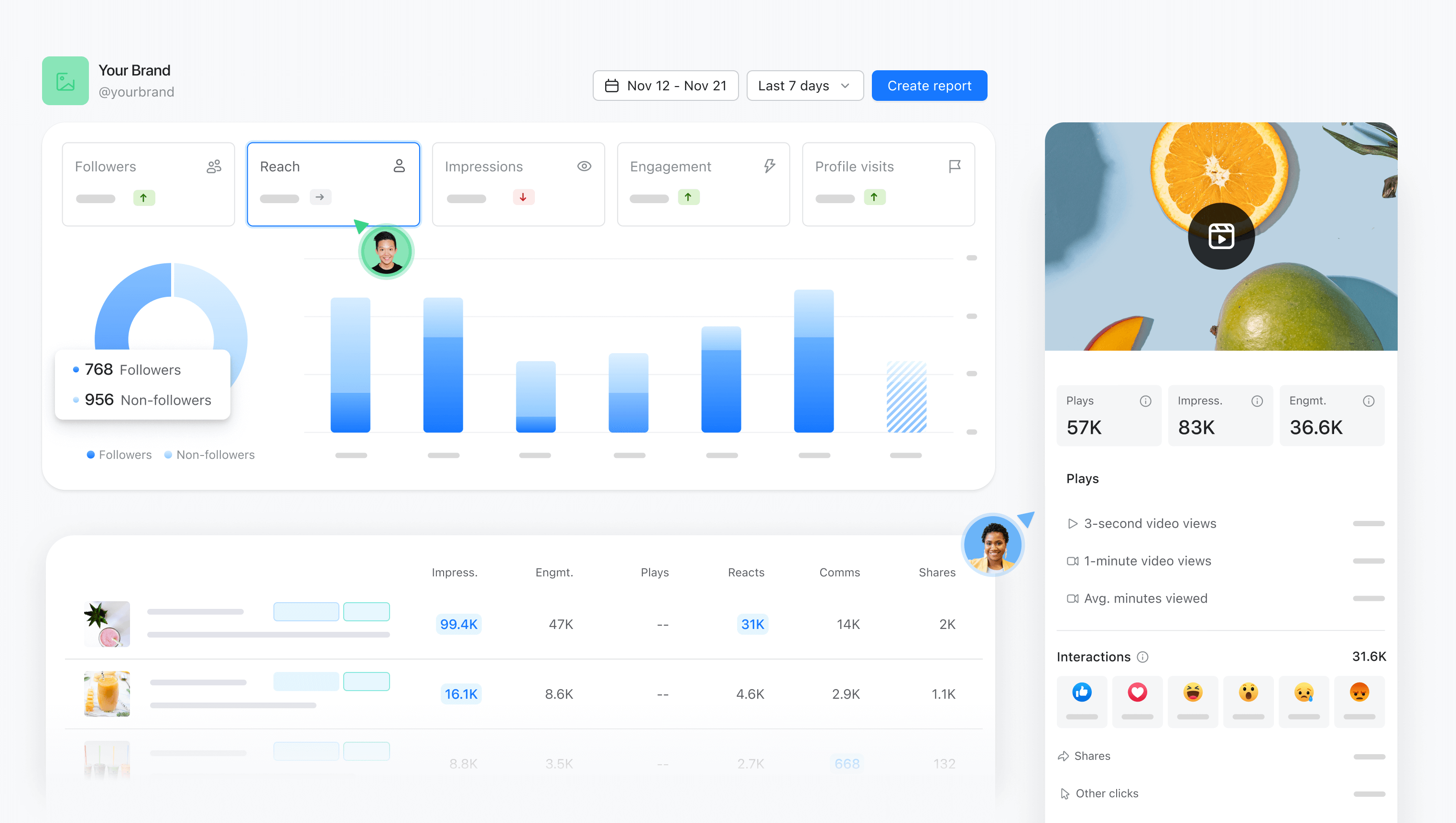

Facebook Analytics in Planable
Planable Analytics is a social media solution that helps marketers collect Facebook page metrics and see the performance of each piece of content. It’s a sleek analytics tool that also covers Instagram and LinkedIn, with more platforms announced to be added soon.
The analytics and reporting tool comes integrated into the Planable complete social media management platform. With a keen focus on collaboration features, Planable enables marketing teams to work together to produce quality content, and then see how that reflects into the overall Facebook performance.
Key features
-
Top-performing content: The clean interface, allows you to easily spot which posts are resonating with your audience, so you can double down on what works. Select top posts based on impressions, engagement, plays, reactions, comments, or shares.
-
Fast reporting: Create customizable reports that show your Facebook metrics over chosen periods of time. Create downloadable reports or share them with your clients or stakeholders through public links. Planable Analytics reports give you clear, easy-to-read analytics data to show the impact of your work and support strategy improvement suggestions.
Drawbacks
-
Planable Analytics doesn’t cover social monitoring, listening, or competitor analysis.
-
You can access the free analytics trial only if you have a paid Planable plan.
Pricing
Planable Analytics is available as an add-on for all of Planable’s paid plans (that start at $11/month). You can try analytics in a free 7-day trial, and after that, you’ll pay $9/month for each workspace you activate it in.
2. Sprout Social: best for streamlined social media data management and post scheduling
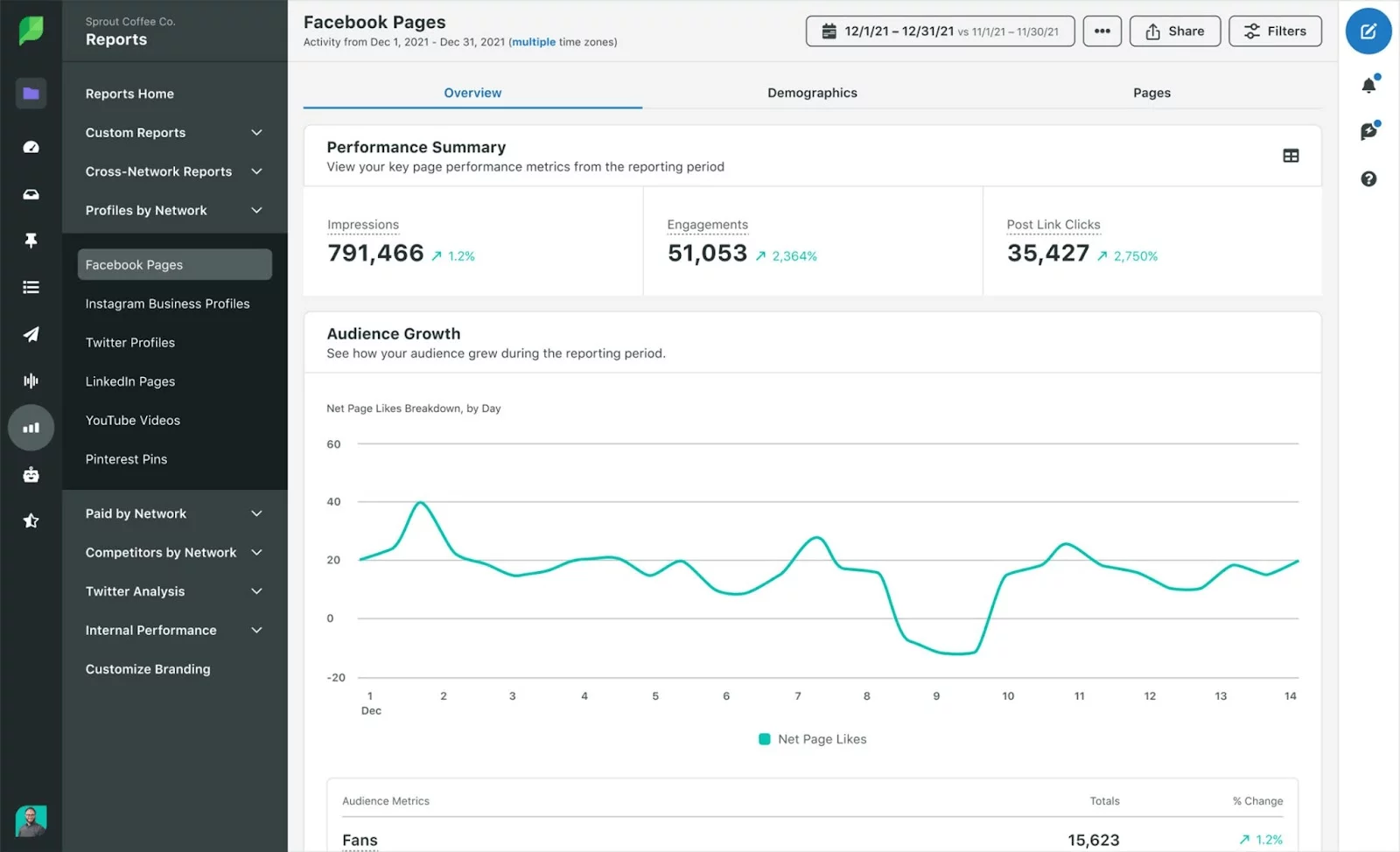

Sprout Social is a social media management platform that provides tools for marketing professionals looking to efficiently manage their social media presence.
It stands out as a reliable Facebook analysis tool, thanks to its user-friendly interface and practical features that make the whole social media management process easier and faster.
Key features
- Post scheduling: Sprout Social lets you plan and schedule your posts on Facebook and other social media platforms. It also suggests the best times to post based on 16 weeks of audience data.
- Reporting: Create customizable reports that show how your Facebook efforts are performing. These reports include interactive charts for a clear view of your analytics data. You can share these social media reports with others using dynamic links. The tool also allows you to focus on the right Facebook metrics by applying filters, so you see only the data that matters to you.
Drawbacks
- Expensive: Sprout Social is pricey, kicking off at $249/month.
- Limited social platforms: The basic plan only lets you link up with 5 profiles. That’s limiting, especially for marketing agencies handling tens of accounts.
Pricing
Sprout Social offers a 30-day free trial. Its starting price is $249/month which lets you connect with 5 social accounts.
3. Hootsuite: best for planning and scheduling all of your content in one spot
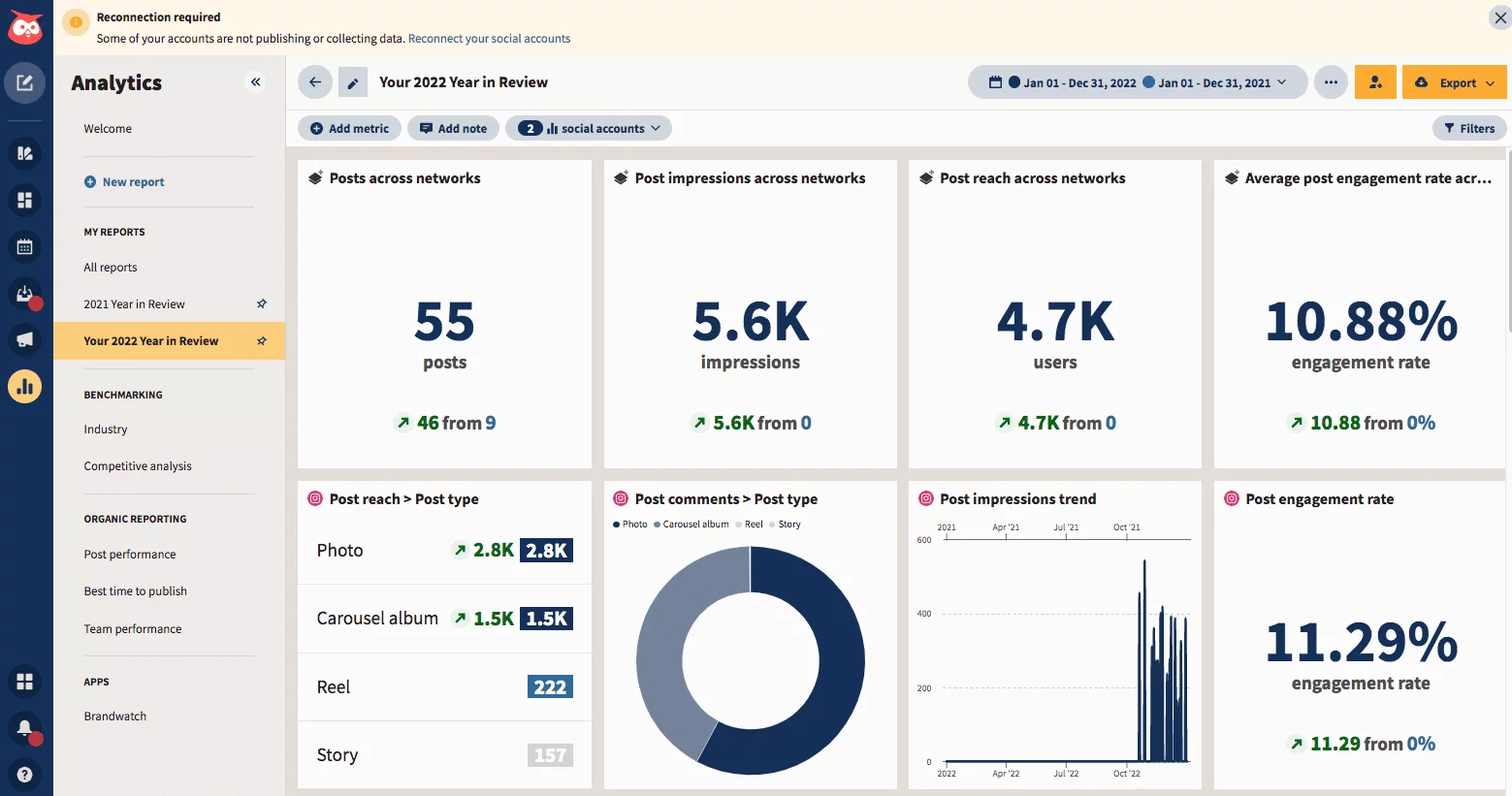

Hootsuite is a social media management platform that allows you to schedule and manage content across various social media channels. It also includes a Facebook analytics tool, giving you insights to improve your Facebook marketing strategy.
Key features
- Analytics: Spot your best campaigns for leads and conversions and view all the metrics in one dashboard — organic, paid, and web. Take a fast look at your total spending and returns, and see which platforms and posts bring in the most revenue.
- Social listening: Hootsuite lets you tune in to what people say about your brand or industry across social media so you can stay in the loop and join the conversation.
Drawbacks
- Steep learning curve: Hootsuite offers many features, so it’ll take a bit of time to get the hang of all of them.
- Analytics could be improved: While Hootsuite’s analytics are great, there’s room for improvement in terms of customization. More ways to tweak and customize reports would be great.
Pricing
Hootsuite’s entry-level plan starts at $99/month, covering 10 social accounts. They offer a 30-day free trial but no free plan in sight.
4. Agorapulse: best for streamlining social media management through social inbox, reporting, and monitoring
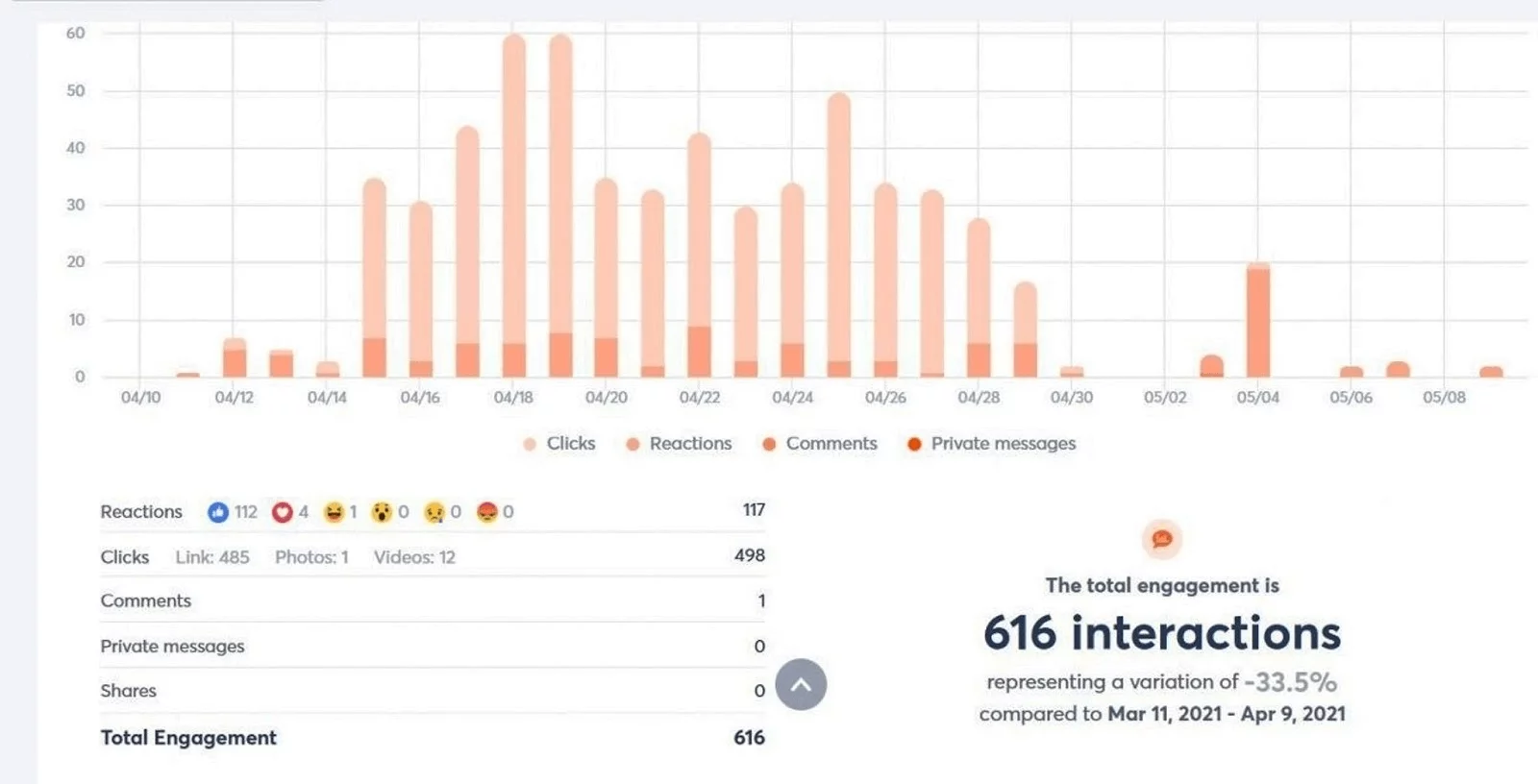

Digital marketers use Agorapulse to schedule social posts, monitor social media channels, engage with audiences, and analyze important metrics.
Key features
- Social media inbox: Agorapulse’s social media inbox consolidates all your messages and comments from various platforms in one place. That way, you can manage and respond to social interactions more efficiently.
- Reporting: Agorapulse’s reporting feature helps you understand which of your Facebook posts are most effective and when they resonate with your audience. Its social reports include key metrics like organic reach, paid reach (Facebook only), total reach, and the number of engaged users for each piece of content.
Drawbacks
- Glitchy mobile app: The mobile app has glitches, causing some users to experience frequent logouts.
- Limited analytics: Agorapulse lacks analytics features for specific post types. For example, you may be unable to compare the effectiveness of reels separately from carousels and single images.
Pricing
Among the Facebook analytics tools I reviewed so far, Agorapulse is the most budget-friendly. It kicks off at 69€/user/month for 10 social profiles. While it gives you a 30-day free trial, there’s no free plan available.
5. HubSpot: best for integrated marketing management, CRM, and detailed reporting
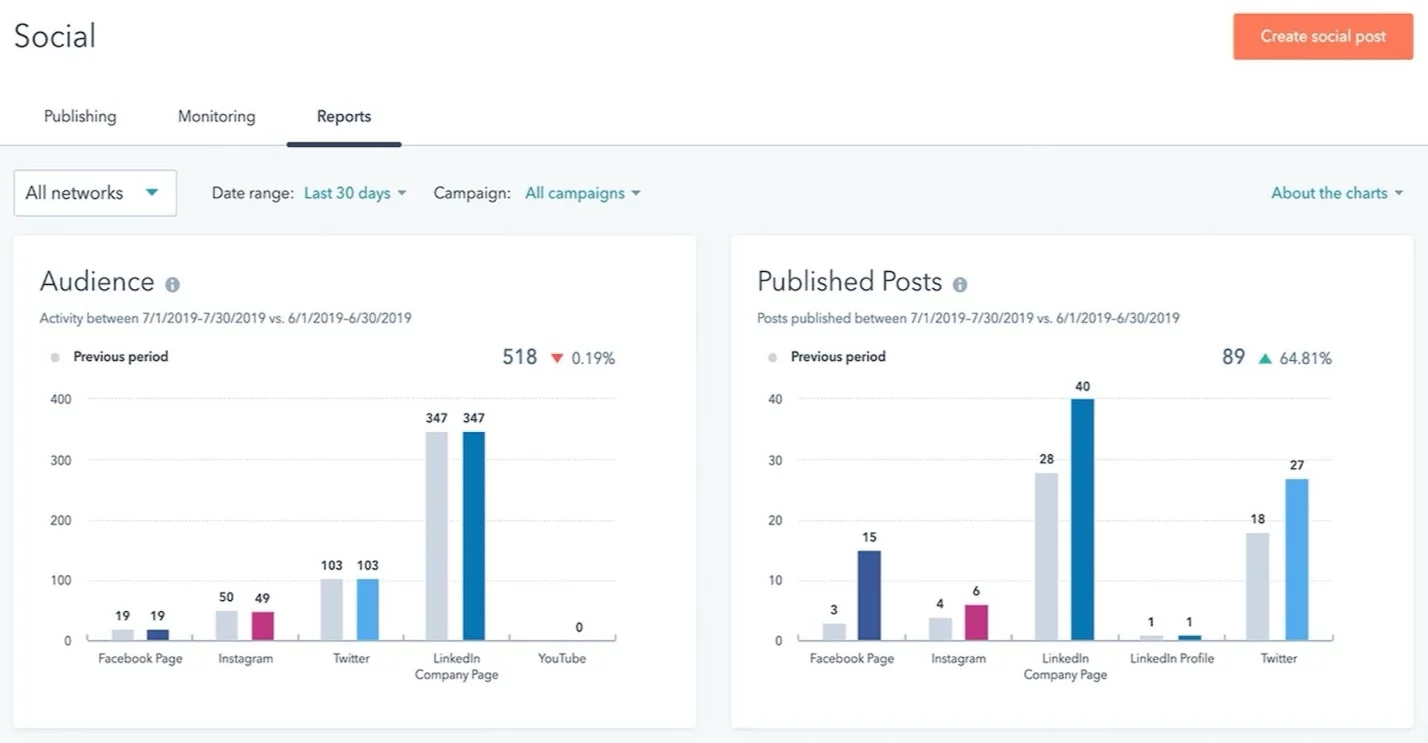

HubSpot is an all-in-one platform that helps businesses manage their online presence, from website building to customer relationship management (CRM).
HubSpot gathers Facebook analytics data, as well as metrics from other social social media platforms such as Instagram, LinkedIn, X, or YouTube. That way, you can track your social media performance, measure ad effectiveness, and analyze audience engagement all in one place.
Key features
- Analytics and reporting: HubSpot provides comprehensive reporting tools. From website analytics to social media metrics, you can track key performance indicators (KPIs), measure the success of your campaigns, and make data-driven decisions to optimize your marketing strategy.
- Behavioral targeting: Create specific and segmented lists based on your customer personas and their interactions with your brand. You can build dynamic email lists reflecting contact behavior and interests.
Drawbacks
- Learning curve: In my experience, HubSpot does have a bit of a learning curve. While the interface is intuitive, exploring its features will take quite some time.
- Pricing: HubSpot’s marketing plans for small teams kick off at $20/month, but the price jumps up depending on how many contacts you want. Say you need an extra 1000 contacts. Now you’re looking at spending $40/month.
Pricing
HubSpot Marketing Hub pricing starts at $20/month if you want to commit monthly.
6. SocialPilot: best for bulk scheduling and comprehensive social media analytics
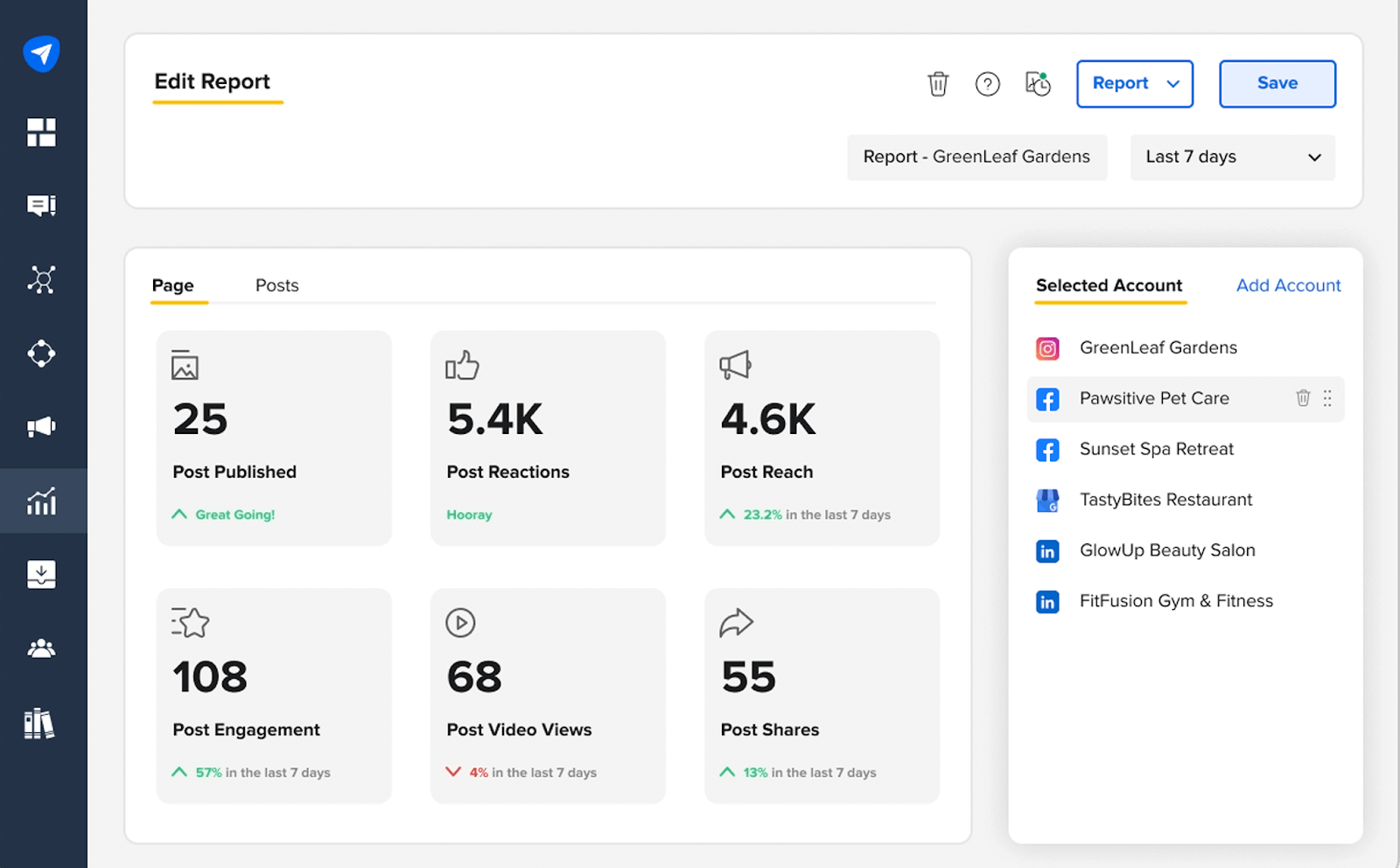

SocialPilot is a social media management tool that provides features such as post scheduling, social media analytics, team collaboration, and content curation.
Key features
- Analytics: With SocialPilot, you can track your Facebook page’s performance. Get in-depth insights into your audience engagement and follower growth, including details about your most active sharers, commenters, likers, and more.
- Bulk scheduling: Schedule up to 500 of your posts or tweets with text and images automatically. What I really like is that you can use the dashboard to map each of your posts to the specific social media account where you want them published.
Drawbacks
- Limited collaboration features: Even though it supports teamwork, team features are quite limited.
- No social listening. As the tool is more focused on content scheduling, it lacks more advanced analytics features like social listening or sentiment analysis.
Pricing
SocialPilot’s Professional plan starts at $30/month for 10 social media accounts. While there’s no free plan, they offer a 14-day free demo for business owners and marketers to test the platform.
7. Keyhole: best for influencer tracking and competitor analysis
![]()
![]()
Keyhole is tailored for in-depth analytics. With a focus on Facebook pages, Keyhole enables users to track engagement, analyze post insights for better social media ROI, and refine their Facebook marketing efforts.
Key features
- Competitor analysis: The social monitoring feature lets you study the performance of your competitors’ Facebook pages, influencers, and Facebook content strategy. Review engagement metrics or share of voice to get valuable insights into your performance compared to top industry players.
- Influencer tracking: With Keyhole, when you track a keyword, brand, or hashtag, it provides insights by surfacing the most influential users in that conversation. These users are ranked by their engagement or number of followers. Also, through keyword and hashtag analytics, you can locate trustworthy influencers in your field.
Drawbacks
- Limitations with the basic plan: The basic plan only links to three social platforms — Facebook, Instagram, and Twitter. If you’re interested in analytics for LinkedIn or YouTube, you’ll need to opt for a pricier plan.
- Uncomfortable UX: Some users find Keyhole not so user-friendly and somewhat challenging to navigate due to its less-than-intuitive interface.
Pricing
Keyhole’s starting price is $79/month, giving you access to 3 social profiles and unlimited scheduled posts. While they offer a free trial, there’s no free plan available.
8. Rival IQ: best for social media audits and competitive analysis
![]()
![]()
Rival IQ is a competitive analysis and social media analytics platform to monitor online competition, track social media performance, and gain insights into the industry landscape.
Key features
- Reporting: Find out what topics you and your competitors use the most and which ones really get the audience buzzing. What’s really hands-on is that you can improve your engagement by breaking down the activity and interest in every type of media available on each platform, like videos, carousels, and more.
- Social listening: I haven’t tried out the social listening feature myself, but based on their website, it seems pretty advanced. With Rival IQ, you can keep tabs on everything from your rivals and campaigns to what’s hot in your industry using natural language processing (NLP). They’ve got AI-powered search and post volume to quickly spot when people start talking more about what you’re looking for.
Drawbacks
- Tiered pricing complexity: Rival IQ follows a tiered pricing structure, which means that as you move up in features, the pricing increases accordingly. This may be a limitation for users who only need a slight expansion of their current plan.
- Setup ambiguity: Setting up Rival IQ might pose a challenge, as the platform presents various options during the setup process. This could lead to a less-than-optimal initial setup.
Pricing
You can start with Rival IQ for $239/month. While there’s no free plan, the 14-day trial lets you explore what Rival IQ offers without any upfront cost.
Facebook analytics FAQs
Is Facebook Analytics still available?
As of July 1, 2021, Facebook Analytics is no longer in use. You can get Facebook metrics by accessing Insights in Meta Business Suite or using dedicated third-party Facebook analytics tools.
How do I get analytics on my Facebook page?
To get analytics on your Facebook page, you can use Meta Business Suite or an alternative social media analytics tool such as Planable Analytics.
Conclusion
Navigating Facebook analytics through the native Meta Business Suite brings headaches to many marketers. Tweaking reports and figuring out the interface is a real challenge. It’s important to overcome this, as Facebook page insights are key to optimizing your Facebook performance and running successful campaigns.
With many Facebook analytics tools to help you monitor your performance, there’s no stopping you from enhancing your social media strategy and achieving greater efficiency in your digital marketing efforts. Step away from the head-aches of busy interfaces, and check out Planable Analytics.
